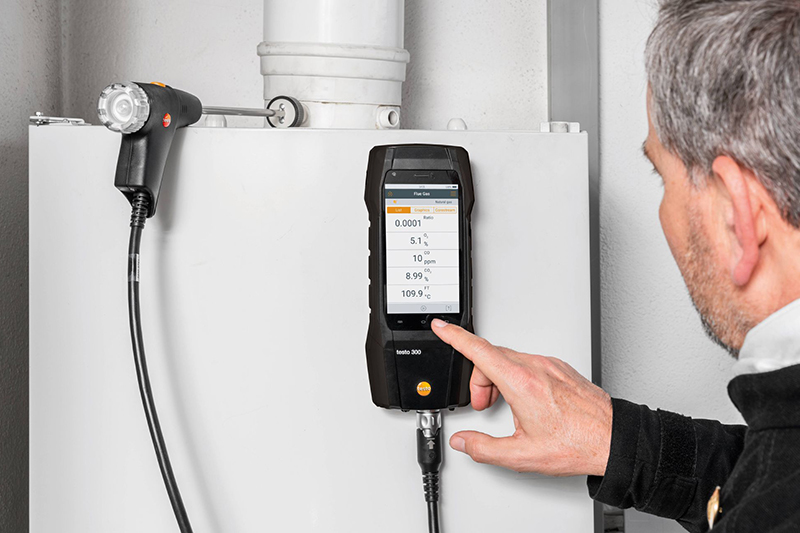
Jon Bawden, HVAC/R Product Manager at Testo, runs through some of the factors to consider when selecting a flue gas analyser.
The flue gas analyser is an essential tool in any boiler or heating engineer’s toolbox, used daily in boiler commissioning and service work. However unlike many other tools, flue gas analysers require special care and attention to make sure you are getting the most out of your equipment and are producing the most accurate results. It is also important for a heating engineer to make sure they choose the right flue gas analyser for the type of work they are performing.
The first thing to consider is the type of work the analyser is going to be used for on a day-to-day basis, this may be primarily testing domestic heating systems all the way up to emissions testing on industrial systems.
If you work in domestic heating you may still wish to check that any analyser on your shortlist can cover all your fuel requirements. It is also worth comparing analysers regarding the sensor specifications, as an analyser having a higher CO limit threshold will potentially mean less chance of an inadvertent CO spike either damaging the analyser or causing a period of having to take the unit out into fresh air to try and purge the measurement cells. Typically, the Testo range of analysers aimed at the domestic market have a 4,000PPM CO sensor and offer automatic pump shut-off if this level is achieved, helping the engineer to prevent damage.
Commercial work
However, if you are also involved in light commercial boiler servicing then it may be better to look to an analyser that has been designed specifically for this type of work. As an example, Testo includes in its range the testo 300LL analyser which has an automatic dilution system to allow the analyser to cope with potential high CO measurement from a badly out of adjustment commercial system.
Whereas most ‘domestic’ level analysers will have potential for damage to the CO measurement cell at high CO readings, the 300LL can quite easily cope with values as high as 30,000ppm due to this dilution system. Another added benefit is the fact that as the measurement cells in testo 300LL are designed to cope with commercial sector work they have a longer expected lifespan of five years.
Sampling probe
Another aspect that should be considered when choosing a flue gas analyser would be the sampling probe, it is important to compare the probes to ensure you choose one that is robust enough to suit your requirements.
Some manufacturers, such as Testo, use a locking connector to ensure gas tightness and fully integrate the flue thermocouple connection making for a simpler and more secure overall connection. Again, for the commercial sector the 300LL offers flexibility with its modular style sampling probe that can be swapped out for different styles to suit the application.
Multi-functional
Functionality is an additional key attribute to consider when choosing your analyser. Depending on your use you may require a different range of functionality. You may just be looking for something basic to record and measure combustion values, however many analysers offer much more than just flue gas measurement with the ability to measure gas tightness and perform let by tests, as well as measuring flow/return temperatures which can help with overall diagnosis of a heating system.
Documenting your readings digitally may also be important to you, ‘Paperless’ recording systems on flue gas analysers allow for easy documentation that can be stored and sent digitally, making your work that much simpler. The testo 300 range provide this and also offer an Android operating system that is directly built into the analyser, offering a flexible interface and direct emailing of reports via connection to Wi-Fi.
Finally, when purchasing a flue gas analyser, you will want to consider servicing and maintenance costs. It is essential that your analyser is calibrated annually to ensure the unit is in proper working condition and can provide you with the most accurate and reliable results, so considering long-term servicing costs is key.
Testo want to make things as simple as possible so have introduced fixed servicing costs for the entire range of analysers for the first five years of operation covering the service and calibration required, as well as any sensor replacement needed. Additionally, the company can offer an accidental damage cover to cover those unexpected issues that your analyser may encounter during its busy working life.













